
Decisions in Economics and Finance
Scope & Guideline
Exploring Innovative Solutions in Economics
Introduction
Aims and Scopes
- Economic Decision-Making Models:
The journal emphasizes the development and analysis of models that describe decision-making processes in economics, including game theory, stochastic control, and optimization techniques. - Financial Risk Assessment and Management:
It covers research related to the assessment and management of financial risks, particularly through innovative frameworks that integrate stochastic processes and actuarial science. - Investment Strategies and Portfolio Optimization:
The focus includes optimal investment strategies, portfolio management, and the application of advanced quantitative methods to enhance decision-making in finance. - Insurance and Pension Economics:
Research on insurance products, pension schemes, and actuarial practices is core to the journal, emphasizing the economic implications and risk management aspects. - Environmental and Sustainability Economics:
The journal also explores the intersection of economics with environmental concerns, focusing on sustainable practices and policies in economic decision-making. - Behavioral Economics and Decision Theory:
It investigates how psychological factors influence economic decisions, integrating insights from behavioral economics into traditional economic models.
Trending and Emerging
- Dynamic Stochastic Models:
There is an increasing emphasis on dynamic stochastic models that incorporate uncertainty and time-varying parameters, reflecting the complexities of real-world economic and financial systems. - Machine Learning and AI Applications:
The rise of machine learning and artificial intelligence in economic modeling and financial forecasting is a prominent trend, showcasing the journal's commitment to integrating cutting-edge technologies into traditional frameworks. - Behavioral Insights in Finance:
Research exploring behavioral aspects of finance, including cognitive biases and decision-making processes, is gaining prominence, indicating a shift towards understanding the psychological components of economic behavior. - Sustainable and Green Finance:
Emerging themes related to sustainability, environmental economics, and green finance are increasingly featured, reflecting the growing importance of these issues in economic decision-making. - Cryptocurrency and Blockchain Analysis:
The journal has seen a surge in research focusing on cryptocurrencies and blockchain technology, highlighting their implications for financial markets and economic systems.
Declining or Waning
- Traditional Financial Instruments:
Research focusing on classical financial instruments such as bonds and basic derivatives has been declining, as more innovative and complex financial products take precedence in the literature. - Static Economic Models:
There appears to be a waning interest in static models of economic behavior, with a shift towards dynamic models that incorporate time-dependent factors and stochastic elements. - Generalized Economic Theories:
The journal has seen a decrease in papers that discuss generalized or broad economic theories, possibly due to a preference for more applied and specific research topics. - Historical Perspectives on Economic Models:
Papers that focus solely on historical analysis of economic theories or models have become less frequent, as contemporary applications and innovations dominate the discourse. - Simple Risk Models:
There is a noticeable decline in publications centered on simple risk models, with a growing preference for complex, multi-dimensional risk assessments that consider various influencing factors.
Similar Journals

Probability Uncertainty and Quantitative Risk
Advancing Insights in Probability and Risk AssessmentProbability Uncertainty and Quantitative Risk, published by the American Institute of Mathematical Sciences (AIMS), is a distinguished open-access journal that has been contributing to the academic community since its inception in 2016. With a focus on the crucial interplay between probability, uncertainty, and quantitative risk assessment, this journal serves as a vital platform for researchers, practitioners, and students engaged in the fields of Applied Mathematics and Statistics. The journal's ranking in the Q2 category for both Applied Mathematics and Statistics and Probability reflects its growing influence and relevance, while its diverse scope encourages interdisciplinary studies. As a part of the Scopus database and maintaining a consistent publication pace through 2024, Probability Uncertainty and Quantitative Risk is essential for anyone looking to remain at the forefront of research in risk analysis and uncertainty modeling. Its commitment to open access since 2016 further enhances accessibility to cutting-edge findings, making it an indispensable resource for academics and industry professionals alike.
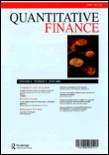
QUANTITATIVE FINANCE
Empowering research excellence in quantitative methods.QUANTITATIVE FINANCE, published by Routledge Journals, Taylor & Francis Ltd, stands at the forefront of academic research in the dynamic fields of finance, economics, and econometrics. With a strong commitment to disseminating cutting-edge research, this esteemed journal, which has been published since 2001 and continues to thrive with an anticipated convergence until 2024, occupies a prestigious Q1 ranking in Economics, Econometrics, and Finance and a Q2 ranking in Finance as of 2023. It serves as an essential platform for interdisciplinary studies, aiming to bridge theoretical approaches and practical applications in quantitative methods. Researchers, professionals, and students are provided access to a wealth of high-quality articles that contribute to the ongoing discourse and advancements in these fields. As the journal continues to impact its community, QUANTITATIVE FINANCE remains an invaluable resource for those seeking to stay at the cutting edge of financial research and its applications globally.
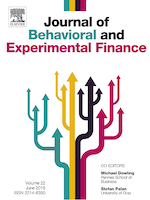
Journal of Behavioral and Experimental Finance
Decoding Financial Behavior for a Better TomorrowJournal of Behavioral and Experimental Finance, published by Elsevier, stands as a premier outlet for groundbreaking research in the realm of finance, particularly focusing on the psychological and behavioral factors that influence financial decision-making. With an ISSN of 2214-6350 and an E-ISSN of 2214-6369, this journal has established itself within the top tier, achieving a Q1 ranking in Finance for 2023, and is currently positioned 10th out of 317 journals in the Scopus category of Economics, Econometrics and Finance, demonstrating a remarkable 97th percentile ranking. Aiming to bridge theoretical advancements with practical applications, the journal encourages submissions that explore innovative methodologies and empirical studies, offering valuable insights for academics, practitioners, and students alike. As a vital resource for those interested in the confluence of psychology and finance, the Journal of Behavioral and Experimental Finance is pivotal in shaping the future of financial research and practice.

International Review of Finance
Fostering impactful research for a dynamic financial landscape.International Review of Finance is a prestigious academic journal published by Wiley, located in the United Kingdom. With its ISSN 1369-412X and E-ISSN 1468-2443, this journal serves as an essential platform for researchers and practitioners in the fields of Economics and Finance. Ranked in the Q2 quartile for both Economics and Econometrics and Finance as of 2023, it showcases high-quality research that contributes significantly to theoretical and practical advancements. Reflecting its standing, the journal is positioned in the 61st percentile in Economics and Econometrics and the 60th percentile in Finance according to Scopus rankings. The scope of the journal includes a diverse range of topics, encouraging innovative discourse across various financial disciplines. Although it does not offer open access, the International Review of Finance continues to be an important resource for academics, professionals, and students seeking to deepen their understanding of evolving financial theories and practices.

Mathematics and Financial Economics
Transforming Financial Practices through Mathematical InsightsMathematics and Financial Economics, published by Springer Heidelberg, is a leading peer-reviewed journal that explores the intersections of mathematical theories and financial practices. With an ISSN of 1862-9679 and an E-ISSN of 1862-9660, the journal has made notable contributions to its field since its inception in 2007, with a convergence period extending until 2024. Positioned in the prestigious Q2 category for both Finance and Statistics and Probability, the journal is ranked within the top 66th percentile in Mathematics and Statistics and the 62nd percentile in Decision Sciences according to Scopus metrics. Researchers and professionals looking for high-quality, innovative research in mathematical finance will find valuable insights within its pages. Although primarily a subscription-based journal, it aims to foster knowledge sharing among academia and industry experts. Its commitment to advancing quantitative methods and financial applications solidifies its importance as a resource for students, researchers, and practitioners dedicated to understanding and navigating the complex dynamics of financial markets.
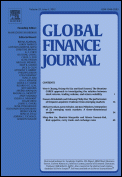
Global Finance Journal
Elevating discourse in finance and economics.Global Finance Journal is an esteemed periodical published by Elsevier, dedicated to the dynamic fields of finance and economics. With an impressive history spanning from 1989 to 2024, this journal holds a significant position in the academic community, boasting a Q1 quartile ranking in both Economics and Econometrics, as well as Finance, as of 2023. It is highly regarded in Scopus rankings, placing 40th out of 317 in Finance and 99th out of 716 in Economics and Econometrics, demonstrating its influence and reach among researchers and practitioners alike. Although not an open-access journal, the Global Finance Journal provides rigorous peer-reviewed articles that explore critical issues, advance theoretical frameworks, and address practical applications in global finance. As such, it serves as a vital resource for researchers, financial professionals, and students aiming to deepen their understanding of economic phenomena and contribute to the ongoing discourse in these vibrant disciplines.
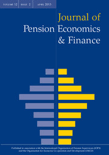
Journal of Pension Economics & Finance
Exploring Innovations in Pension EconomicsJournal of Pension Economics & Finance, published by Cambridge University Press, is a pivotal resource for scholars and professionals immersed in the intricacies of pension systems, investment strategies, and the economic forces shaping financial security in retirement. Established in 2002, this esteemed journal focuses on cutting-edge research and theoretical insights that intersect the fields of Economics, Finance, and Organizational Behavior, boasting a commendable Impact Factor reflected in its Q2 ranking across multiple categories in 2023. With a diverse range of articles that inform both policy and practice, the journal serves as an essential platform for disseminating knowledge and fostering discussions that advance the understanding of pension economics and finance through rigorous analysis. Contributions are indexed in prominent databases, enhancing visibility and accessibility for interested researchers and practitioners in the global community. As such, the Journal of Pension Economics & Finance is a must-read for anyone dedicated to tackling the financial challenges and opportunities that prevail in pension management today.
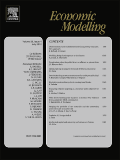
ECONOMIC MODELLING
Pioneering Research that Transforms Economic Modelling.ECONOMIC MODELLING, published by Elsevier, is a leading academic journal in the field of Economics and Econometrics, with a commendable impact factor that underscores its significance within the research community. Since its inception in 1984, this journal has been pivotal in disseminating high-quality research that contributes to the advancement of theoretical and empirical methodologies in economics. As a Q1 journal in its category, it ranks in the top 88th percentile according to Scopus, solidifying its reputation as an influential platform for economists and academicians. Although it does not offer open access, the journal maintains a robust subscription model, ensuring wide distribution of critical insights and findings. Researchers, practitioners, and students are encouraged to engage with the latest developments in economic modelling, making ECONOMIC MODELLING an essential resource for anyone seeking to understand and contribute to the evolving landscape of economic theory and application.
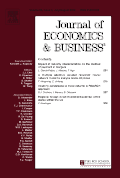
JOURNAL OF ECONOMICS AND BUSINESS
Driving Insights for a Dynamic Economic LandscapeJOURNAL OF ECONOMICS AND BUSINESS, published by Elsevier Science Inc, stands as a leading platform for the dissemination of research in the fields of economics and business management. With an ISSN of 0148-6195, this journal is indexed in Scopus and boasts impressive rankings, including a position in the top 20% for both Finance and Economics and Econometrics. With a consistent publication history since 1978, it has become a vital resource for scholars and practitioners alike, providing insights into contemporary issues and emerging trends in the economic landscape. The journal, categorized in the Q2 quartile for both Business and Economics, invites rigorous research that advances theoretical and practical knowledge. While it operates under a subscription model, its notable impact factor reflects its significance and relevance in addressing critical questions within the business and economics domains. Whether you are a researcher, a business professional, or a student eager to deepen your understanding, the JOURNAL OF ECONOMICS AND BUSINESS is an essential resource for your academic and professional journey.

Journal of Economics Finance and Administrative Science
Transforming insights into impactful solutions.Journal of Economics Finance and Administrative Science, published by Emerald Group Publishing Ltd, is a premier open-access journal that has been at the forefront of advancing knowledge since its inception in 2012. With an ISSN of 2077-1886 and E-ISSN of 2218-0648, the journal caters to the disciplines of economics, finance, and administrative sciences within an international context, specifically observing trends from Peru and beyond. This highly regarded journal holds a Q1 ranking in Economics, Econometrics and Finance for 2023, landing it in the top percentile among its peers, with an impressive Scopus rank of #33 out of 288 in general economics. Since transitioning to open access in 2017, the journal has democratized access to cutting-edge research, making it indispensable for researchers, professionals, and students alike. By publishing rigorous empirical studies, comprehensive reviews, and innovative theoretical contributions, the Journal of Economics Finance and Administrative Science aims to facilitate knowledge exchange and foster collaboration within the global academic community.